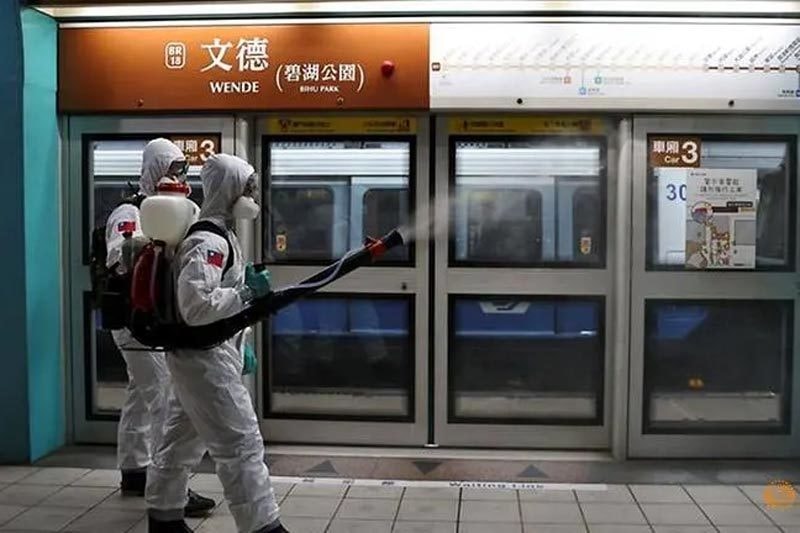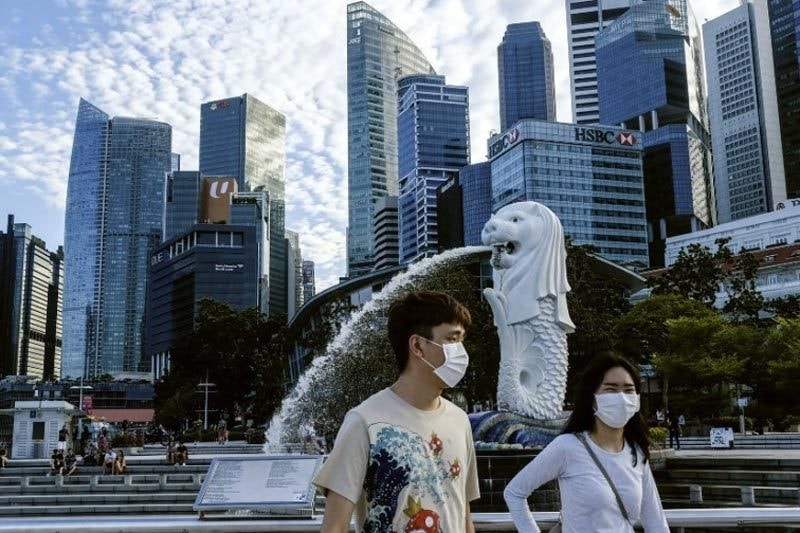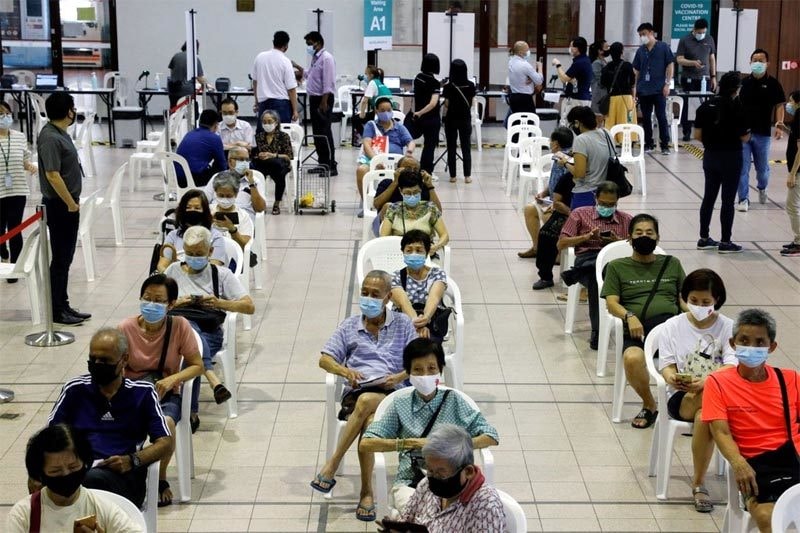Causes of re-emergence of Covid-19 'models'
Once hailed as successful examples of fighting the Covid-19 pandemic in Asia, Singapore and Taiwan (China) are now witnessing a sudden surge in the number of cases.
Since the beginning of this year until the end of April, the number of new daily infections in both Singapore and Taiwan has been almost zero or in single digits.
However, just last week, Singapore recorded 248 new cases of SARS-CoV-2 infection, while Taiwan had 1,200 new cases in the community, forcing authorities to tighten restrictions and close schools.
Compared to many other "hotspots" of the epidemic in the world, the above numbers are relatively small. But for Singapore and Taiwan, they were unthinkable just a few months ago. So what is the reason for the resurgence of the epidemic in two models of Asia against Covid-19?
|
| Soldiers wearing protective gear spray disinfectant at a subway station after a spike in Covid-19 cases in Taipei, Taiwan. Photo: Reuters |
Taiwan
According to the BBC, Taiwan was one of the first places to "ban" foreign tourists shortly after mainland China announced the discovery of a mysterious pneumonia-causing virus. These tough border controls remain in effect.
However, the island's government and residents are starting to let their guard down. Local hospitals have stopped conducting tests, said Lin Hsien-ho, an associate professor at Taiwan National University.Covid-19for people with fever, a common symptom of infection with the new coronavirus.
According to data from the online statistics site Our World in Data, Taiwan was conducting an average of 0.57 tests per 1,000 people in mid-February. Meanwhile, the rate during the same period in Singapore was 6.21 and in the UK was 8.68.
"Doctors no longer took the outbreak seriously. Hospitals let down their guard and did not conduct much contact tracing. There was definitely a sense of complacency in the community," Dr. Lin said, adding that the reality stemmed from a widespread belief that the virus could not penetrate Taiwan's tight border fences.
The problem became serious when local authorities relaxed the quarantine requirement for unvaccinated pilots from the original 14 days to five days and finally to just three days.
Soon after, a cluster of infections emerged, involving a small number of China Airlines pilots who had stayed at the Novotel Hotel near Taoyuan Airport. Many of the cases in this cluster were found to have the B.1.1.7 variant originating from the UK.
The virus then spread through the community and eventually entered "teahouses," Taiwan's adult entertainment venues. "People were singing, drinking, and interacting frequently in a closed environment. It was not just one teahouse, but many teahouses on the same street, a very large-scale super-spreading incident," Dr. Lin described.
Epidemiologist Chen Chien-jen added that the reluctance of many people who tested positive to disclose their visits to such adult entertainment venues makes contact tracing even more difficult. “It reminds us that even if a very small proportion of the population violates the rules, it will lead to disaster,” Professor Chen explained.
According to Mr. Chen, Taiwan has not learned the lesson from Japan's adult entertainment industry, which was also a "hot spot" of infection at one point before being forced to temporarily shut down.
Associate Professor Alex Cook of the National University of Singapore (NUS) assessed that Taiwan's situation reflects the risks of a strategy that focuses too much on border control and not enough on measures to prevent the spread of pathogens within the territory.
|
| Singapore decided to re-impose strict restrictions, similar to the lockdown from a year ago from May 16 to June 13 to respond to the worrying developments of the pandemic. Photo: AP |
Singapore
It’s a different story in Singapore. Covid-19 measures are strict despite low case numbers. Public gatherings of more than eight people are not allowed. Clubs are not allowed to reopen and restrictions on large gatherings such as weddings remain.
But gaps remain in the national vaccination program, and by late April, Changi Airport, home to a popular shopping mall, had become the country’s biggest outbreak this year.
Authorities discovered that a large number of airport staff who tested positive for SARS-CoV-2 had worked in an area that handles arrivals from high-risk countries, including several South Asian countries. Some of these staff then went on to dine at the airport’s food courts, which are open to the public, further spreading the virus. As a result, Singapore has now temporarily closed Changi terminals to non-airline passengers.
Many of the cases were later found to have been infected with B.1.617, a highly contagious variant that first emerged in India.
Singapore has also announced that flights and passengers from high-risk countries and regions will be separated from those from lower-risk areas. Airport staff will also be required to work in separate areas.
Some have questioned why such measures were not taken sooner when potential vulnerabilities were identified a month earlier. But Professor Teo Yik Ying, Dean of the NUS School of Public Health, believes the arrival of the new variant in the Lion City was “inevitable”.
“I understand why people are frustrated because the majority of Singaporeans have been strictly following the rules. But we are not like China, which can completely shut down. Our country, our economy, is tied to our reputation and status as a trading hub. If you look at the US last year, the worst cases were not from China, but from people entering from Europe. How many countries can Singapore close its borders to?” Mr. Ying expressed.
Meanwhile, Professor Cook believes that Singapore is still in a "very good position" to control the epidemic. According to this scholar, compared to the UK, the number of new infections per day in Singapore is only about 10% of the UK's level after adjusting for differences in population size. The Lion City is just tightening its preventive measures to avoid falling into a "broken" situation.
|
| Elderly people wait to get vaccinated against Covid-19 at a vaccination center in Singapore. Photo: Reuters |
The vaccination process is slow.
According to BBC, both Singapore and Taiwan are facing a headache problem with Covid-19 vaccination.
Many people in Taiwan are reluctant to get vaccinated when things are going well, and concerns over AstraZeneca, the main vaccine the island is stockpiling, have added to that hesitancy.
But the spike in cases has prompted a rush to get vaccinated in Taiwan. The problem is that authorities don't have enough vaccines to go around. So far, the island of 24 million has received just 300,000 doses.
Professor Chen said the local government has tried to buy vaccines from international companies but has been unsuccessful. For them, the only solution to maintain supply is to produce them themselves. Taiwan is taking the necessary steps to produce two types of home-made vaccines, which are expected to be available to users as soon as the end of July.
The same is true in Singapore. About 30% of the population has received at least one dose of the Covid-19 vaccine, the highest vaccination rate in Southeast Asia, according to statistics from Our World in Data. But the country is facing supply difficulties despite the government's goal of vaccinating the entire population by the end of the year.
Professor Teo said the need for vaccines will be long-term and Singapore needs to quickly produce its own vaccines like the UK, the US or China so as not to be dependent on supply. He noted that the strong resurgence of the epidemic in both Singapore and Taiwan is a lesson for countries and territories that may be witnessing a decline in cases.
“When I see countries in Europe or the US starting to relax their Covid-19 measures, I think they should be very cautious and look to the world to see what is going on. What happened in Taiwan and Singapore is a sign that we should not let our guard down,” Mr. Teo emphasized.




